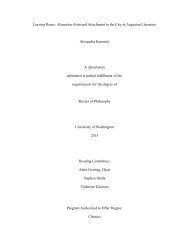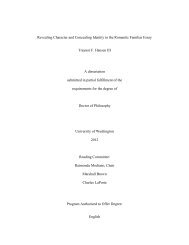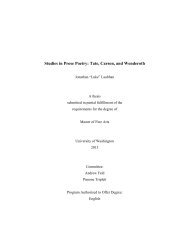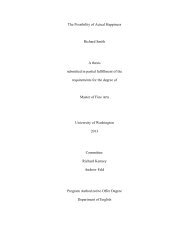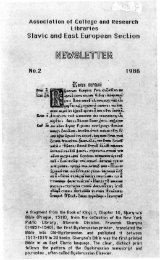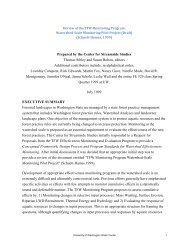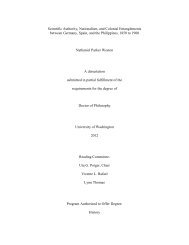Copyright 2012 Aileen M. Echiverri-Cohen - University of Washington
Copyright 2012 Aileen M. Echiverri-Cohen - University of Washington
Copyright 2012 Aileen M. Echiverri-Cohen - University of Washington
Create successful ePaper yourself
Turn your PDF publications into a flip-book with our unique Google optimized e-Paper software.
INTRODUCTION<br />
Failure <strong>of</strong> inhibitory processes involved in the voluntary suppression <strong>of</strong> information (i.e.,<br />
stimuli classified as irrelevant for an ongoing task; Harnishfeger & Bjorklund, 1993;<br />
Harnishbeger, 1995) have been implicated in the development, maintenance, and treatment <strong>of</strong><br />
posttraumatic stress disorder (PTSD; Vasterling, Duke, Brailey, Constans, Allain & Sutker,<br />
2002). Given that preliminary work suggests that treatment recovery is associated with<br />
improvement in cognitive deficits in inhibition (e.g., Vermetten, Vythilingam, Southwick,<br />
Charney, & Bremner, 2003), treatment outcome in PTSD should be related to measures <strong>of</strong><br />
inhibition; however, no study has directly examined this relationship.<br />
Many researchers and theorists (e.g., Blechert, Michael, Vriends, Margraf, & Wilhelm,<br />
2007; Rothbaum & Davis, 2003) conceptualize PTSD as an overgeneralization <strong>of</strong> stress<br />
responding to non-fearful stimuli. Although pre-existing inhibitory deficits may increase the<br />
likelihood <strong>of</strong> this overgeneralization, over time this overgeneralization may lead to a breakdown<br />
<strong>of</strong> inhibitory processes associated with executive functioning (Bremner et al., 1993; Sutker,<br />
Davis, Mark, Uddo, & Ditta, 1995). Specifically, there is accumulating evidence from<br />
neuroimaging studies that the medial prefrontal cortex (mPFC) assumes an inhibitory role in<br />
emotion and cognition (Whalen et al., 1998; Bush, Luu, & Posner, 2000, Kerns, <strong>Cohen</strong>,<br />
MacDonald, Cho, Stenger, & Carter, 2004). PTSD is characterized by functional abnormalities<br />
between the mPFC and amygdala (Gilboa et al., 2004; Lanius et al., 2001). Specifically, reduced<br />
activity in the mPFC and greater activity in the amygdala in PTSD is thought to reflect a<br />
potential failure <strong>of</strong> the mPFC to inhibit an overactivated amygdala (e.g., Morgan, Grillon,<br />
Southwick, Davis, & Charney, 1996; Bremner, Narayan, Staib, Southwick, McGlashan, &<br />
Charney, 1999; Quirk & Beer, 2006). Thus, abnormalities in the functional relationship <strong>of</strong> these<br />
4



